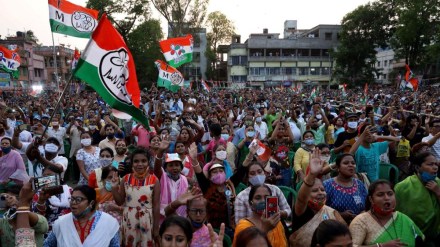The relationship between the state and big business continues to figure prominently in the campaign speeches in this Lok Sabha elections, too. The issue is an important one as India strives to achieve its goal of a developed India by 2047. Several studies, including one by the Reserve Bank of India, has shown that the Indian economy has to grow by 8% till 2047 to cross the $14,000 cut-off level to join the band of high-income nations. This looks like a tall order, but it’s certainly a good target to have. The point, however, is that to reach anywhere near that target, the long-term plans and policies must have a prominent place for private enterprises as it’s clear that the government does not have the capacity to continue with its high capital expenditure going year after year. It’s also a fact that private investment has not exactly taken off over the past 10 years.
Even discounting the inevitable shrillness of election campaign speeches, it seems India’s political leaders are still confused over their approach towards big business and prefer the safer route of wearing the pro-poor, anti-rich badge on their sleeves. Look at Rahul Gandhi’s tirade against the “top five businessmen” and their alleged link with Prime Minister Narendra Modi. He has also promised to “give the same amount of money that Modi has given to the top two — Adani and Ambani — to the people of India through the various schemes the party promised if voted to power after the elections”. No one can deny the existence of crony capitalism in India, but treating big business as a favourite punching bag must have an expiry date, especially if there is no concrete evidence.
One had expected the Prime Minister to be a bit restrained on this issue at least. But the gloves came off this time when he accused the Congress of going silent on Adani-Ambani and wondered whether this was because the party and its “shahzade” got tempo-loads of money from the industrialist duo. This is a direct accusation of corrupt practices — again without any evidence. If there is one, the ruling party should have taken action by now, instead of using their name loosely to score a political brownie point. It only betrays the Bharatiya Janata Party’s (BJP) defensive approach ever since Gandhi’s jibe that the Modi government was a “suit-boot ki sarkar” (a government that only looks after the rich). Though the BJP has clarified that the PM was merely questioning the Congress’ silence on Adani-Ambani, the argument doesn’t wash. The fact is that Gandhi hasn’t been silent on the issue at all.
In subsequent television interviews, Modi has, of course, sought to transition seamlessly from political discourse to his economic philosophy and has expressed his keenness to foster an environment where wealth creators are respected and celebrated. “For the bright future of my country, as much as I worry about the sweat of the labourers, the same way I worry about the wealth of wealth creators,” he said. But industry leaders would be well within their rights to feel less confident about the assurances after the unkind remarks against two of their colleagues in the not-too-distant past. Instead of using industry as a pawn for political mud-slinging, the new government should stay firmly focused on the big picture — reforming the economic and financial architecture. That’s the only way to make wealth creators feel welcome.
